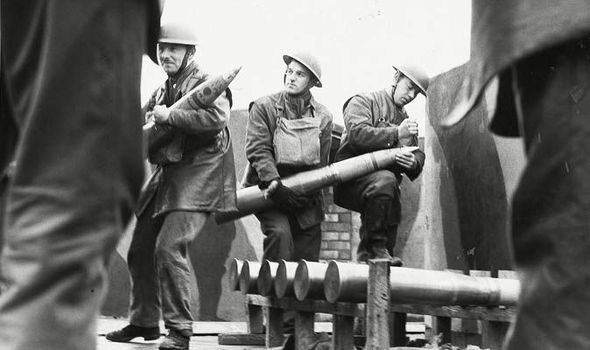An air raid took place at the Vickers Aircraft Factory at Weybridge, Surrey and a section leader of the Home Guard rushed in to find himself face to face with an unexploded 500 lb. bomb. In his 36 years, he had never seen one so near as he led his party of men, handling it with care to haul and secure it to a piece of scrap to be towed away by truck to a safe distance. That day was September 21, 1940 and his efforts won him the George Cross. He later enlisted with the Royal Engineers and was killed in Normandy in the year 1944.
Unlike the bumbling nature of the men in Dad’s Army, a light hearted recreation for TV of the old Home Guard during the war, the men were up to the job at hand when confronted with a crisis.
Another recipient of the George Cross saved the lives of 6 people found unconscious in a cellar filled with gas fumes. The section commander was lowered repeatedly into the space in order to pull men out, dying in the last attempt while pulling 2 men clear.
Many people feel the men of the Home Guard would have come to grief quickly at the hands of the well trained German army with its mechanized armor columns. However, the men guarding the coastline were developed into a disciplined and organized force that also had a few tricks up their sleeves.
They contrived to make their own flamethrowing weapons and various camouflaged roadside bombs to surprise invading army units. Their Flame Fougasse could send a barrel full of flaming gelled petrol onto a target and there were 50,000 buried in preparation for an invasion in 1940.
Even the older men were capable of heroic efforts, like Lieutenant William Foster, a 61 year old veteran of the Boer War who was seriously wounded while serving in the 2nd Imperial Light Horse and a recipient of the Military Cross as a member of the 3rd Battalion Royal Fusiliers in the First World War fighting at Ypres and Mons. He was still to receive the George Cross as a member of the Home Guard, as on September 13, 1942, he threw himself over a bomb as part of a training exercise gone wrong, the bomb landing in a trench full of men, dying to save or prevent from harming 30 of his fellow soldiers.
With the fall of France and having taken Western Europe, Hitler set forth plans to invade England, issuing his public directive to strike fear into the heart of his adversary, the Express reports.
“As England, in spite of her hopeless military situation, still shows no signs of willingness to come to terms,” Hitler’s words boldly proclaimed. “I have decided to prepare, and if necessary to carry out, a landing operation against her.”
Continuing on, “The aim of this operation is to eliminate the English Motherland as a base from which the war against Germany can be continued and, if necessary, to occupy the country completely.”
How militarily viable Hitler’s invasion plans were will never be known, as Operation Sea Lion was canceled in February, 1942. The home front in wartime viewed the Home Guard as a courageous unit that stood in the face of the enemy, prepared to fight to the last stand if necessary. A film was released as a propaganda effort in support of the Home Guard, called Went The Day Well, with heroic actions of the men against an invading German military advance force.
